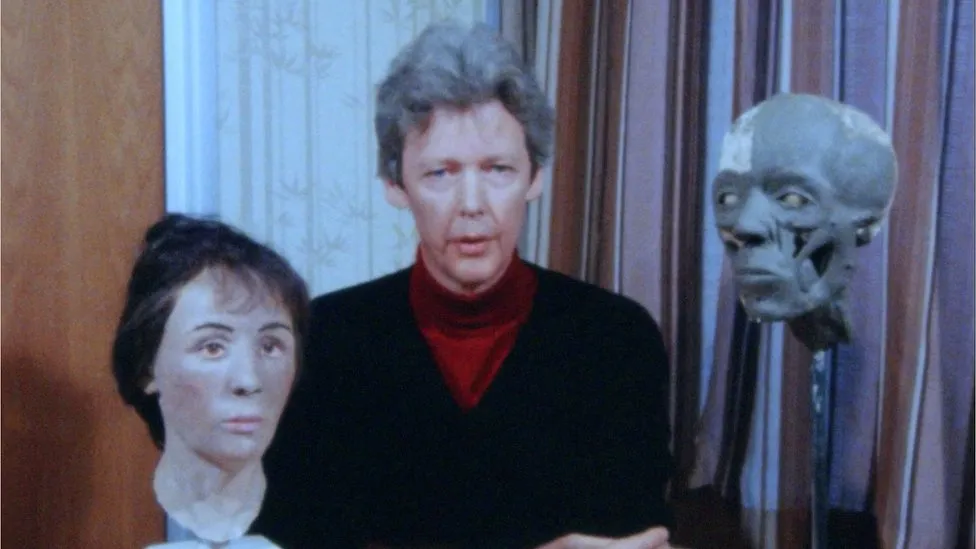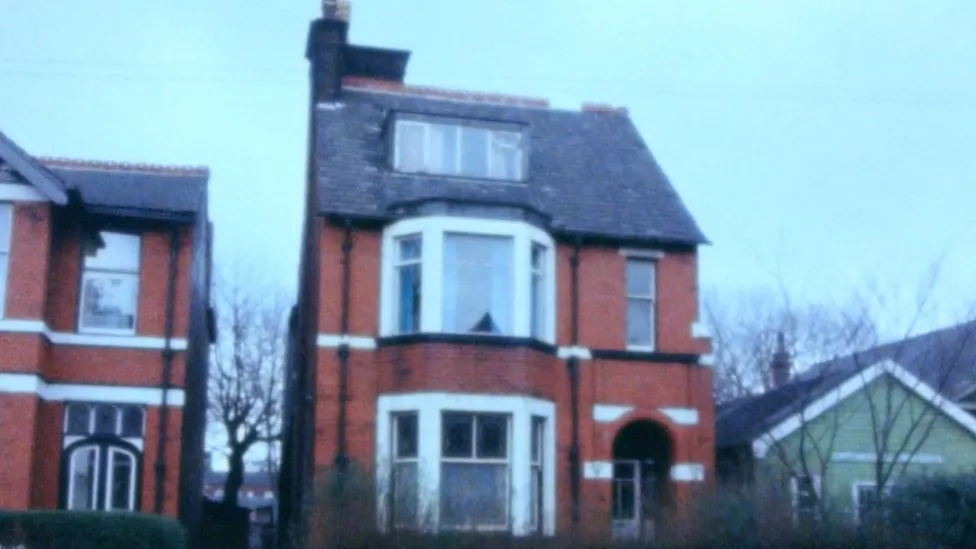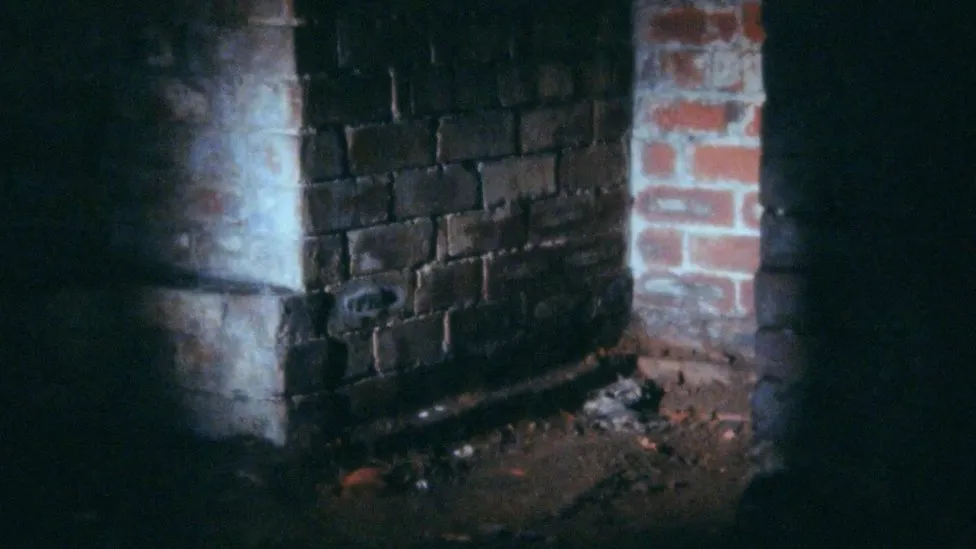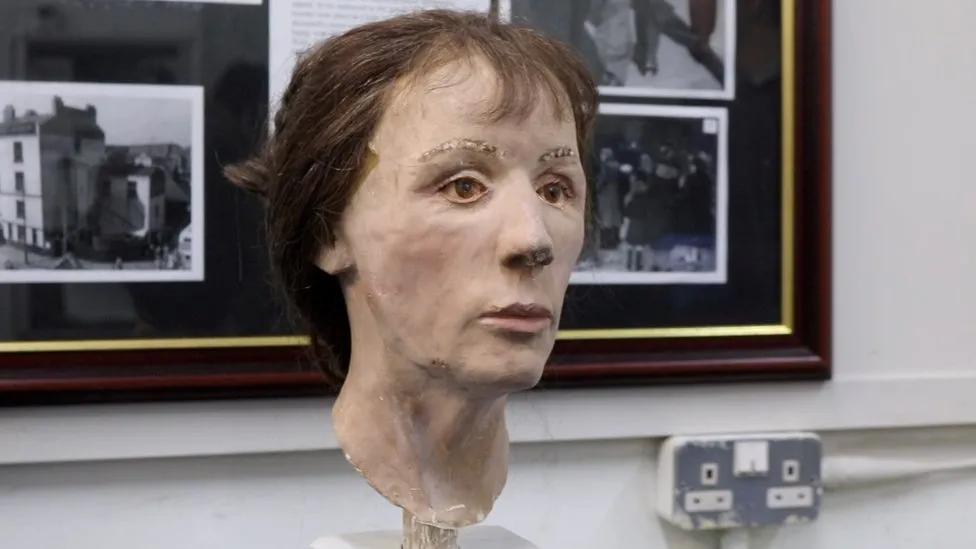The Forgotten Dead - Mary Ellen, Bolton UK.
Dec 17, 2022 14:01:51 GMT
via mobile
kittylady and waterslide like this
Post by no1novice on Dec 17, 2022 14:01:51 GMT
Woman's body found in Bolton cellar mystery reinvestigated
Published
3 days ago

An expert believes "Mary Ellen" may have looked like this
By Jane Wilkinson & Daniel O'Donoghue
BBC News
Exactly 40 years ago, a woman's partially mummified remains were discovered in the cellar of a house, wrapped in a newspaper from 1966.
Detectives still do not know the real identity of the woman they nicknamed Mary Ellen.
Now a new BBC Radio Manchester investigation, The Forgotten Dead, has re-examined the case in an effort to solve the mystery.
A house in Bromwich Street, Bolton

Her remains were discovered at a house in Bromwich Street, Bolton, on 14 December 1982
One of those originally involved in the investigation was Rick Armstrong.
"A fella called John Baxendale was renting the house at the time," the retired detective told the BBC.
"He went down to the cellar to explore and to clean up the rubbish. In one corner he found some cardboard and paper, and what he thought was a tailor's dummy. Then he realised a tailor's dummy doesn't have bones.
"So for reasons best known to himself, he picked up the head and put it in a carrier bag and walked it round to Castle Street police station."
The major police investigation launched that day, and it has never truly ended.
"The remains that were found were mainly bones, with the hands and arms in a mummified condition," Mr Armstrong explained.
"It was wrapped as if somebody had lain down and rolled over in cardboard and paper to keep themselves warm.
"It was speculated that this person was probably a vagrant or somebody who went from town to town and tried to get on someone's settee for a night's sleep. She'd just gone in there, gone to sleep and never woke up."
Bromwich Street cellar where the woman was found

The spot in the cellar where the woman's body was found
The News of the World found around the woman's body was dated 13 March 1966, naturally leading police to believe her remains could have lain undiscovered for 16 years.
A later forensic examination suggested the woman had been white, about 40 years old and possibly only 4ft 10in (147cm) tall.
The Home Office pathologist also revealed there had been no sign of anyone else being involved in her death.
'Somebody put her there'
But that's not what former Bolton Evening News crime reporter Steve Howarth believes.
Among the first people on the scene, he covered the Mary Ellen story from the beginning.
"There was absolutely no way this poor woman crawled in there and just died," he said. "Somebody put her there. I'm pretty sure of it.
"It's all pure speculation but my gut feeling is that she came to an unfortunate end at the hands of someone else or possibly as a result of an accidental drug dose.
"Somebody dumped her in a corner hoping that nobody would find her, and nobody did for 16 years."
It's not a view shared by Greater Manchester Police.
Its cold case review unit is confident in the original theory that she had been homeless.
It says there is simply no evidence that she was a victim of crime, or that anyone else was involved in her death.
'Pioneering'.
Back in 1982, Bolton CID's first concern was to learn Mary Ellen's real identity.
Descriptions of her clothing - a turquoise jumper, yellow cardigan and brown stretch trousers - were shared with the media.
It was also hoped her jewellery might yield some clues.
She was found wearing one gold cross earring, a gold eternity ring on her left hand, and black rosary beads.
Sadly the jeweller, traced by police to Birmingham, said most of it was mass produced and could offer no more help.
Three months later, the team still had no leads.
And so, in a ground-breaking move for the time, detectives turned to a pioneering new technique - facial reconstruction.
They asked forensic artist Richard Neave, then working for Manchester University, to create a likeness of Mary Ellen's face using scientific measurements of her skull and strips of modelling clay.
Richard Neave

Richard Neave created a likeness of Mary Ellen's face using ground-breaking techniques
Mr Neave said: "I do remember her. She had a wig and eyelashes glued on by a friend of mine who was a make-up artist at a TV company. Not something I'd tend to do now.
"It wasn't a portrait, it can never be a portrait, because I don't know exactly the shape of her chin and the tip of the nose. Or whether she has spots, pimples, scars, freckles. So It's not necessarily her face, but it's a face which is broadly similar."
When unveiled to the media in February 1983, it gained national attention since it was the first time the technique had ever been used in a public appeal by a British police force.
Mr Howarth was at the press conference.
"That's when the interest really took off," he said.
"Normally, it would just be me and the guy from the Manchester Evening News, but all the seats were full. All the nationals were there. So it was a good idea at the time, to broaden the publicity."
It worked. A tip did come in.
Lily Jones was watching a TV news report at her home in Liverpool, and was sure Mary Ellen could be her mother, Ruth, who had been missing since the 1960s.
But there was no proof, only speculation, until 2009, when Mr Armstrong was asked to re-open the investigation.
In a rare move, he secured permission for Mary Ellen's body to be exhumed from Bolton's Heaton Cemetery, where she'd been buried in an unmarked grave.
A DNA sample - a science which had not been available back in 1982 - was taken. But would it prove that Mary Ellen was Lily's missing mother?
"If there was enough points of match then we could positively say she was Ruth," Mr Armstrong explained.
"But it didn't match. It wasn't Ruth in the grave."
'Mystery'
Today, Mary Ellen's facial reconstruction is on display at the Greater Manchester Police Museum where she still attracts a huge amount of attention.
Curator Katie Henderson said: "When you come into the crime room, her case is directly in front of you so she is one of the first things you see. I think the face looks quite serene. She has a calm expression as if she is steadily observing everybody so I do think she draws you in.
"Often young children will ask if she is real. And we say she's real in that she was a person who was alive once but her real name is a mystery. It's something that people always remember."
A 1983 inquest recorded an open verdict, which effectively means the cause of her death remains as much of a mystery as her real identity.
There is a glimmer of hope though, as The Forgotten Dead investigation has discovered.
A new technique known as investigative genetic genealogy could help identify her once and for all.
Find out more by listening to The Forgotten Dead: The Body in the Cellar, on BBC Sounds.
And if you have any information about Mary Ellen please email jane.wilkinson@bbc.co.uk.
www.bbc.co.uk/news/uk-england-manchester-63726889
Podcast www.bbc.co.uk/programmes/p0dnycg2
Published
3 days ago

An expert believes "Mary Ellen" may have looked like this
By Jane Wilkinson & Daniel O'Donoghue
BBC News
Exactly 40 years ago, a woman's partially mummified remains were discovered in the cellar of a house, wrapped in a newspaper from 1966.
Detectives still do not know the real identity of the woman they nicknamed Mary Ellen.
Now a new BBC Radio Manchester investigation, The Forgotten Dead, has re-examined the case in an effort to solve the mystery.
A house in Bromwich Street, Bolton

Her remains were discovered at a house in Bromwich Street, Bolton, on 14 December 1982
One of those originally involved in the investigation was Rick Armstrong.
"A fella called John Baxendale was renting the house at the time," the retired detective told the BBC.
"He went down to the cellar to explore and to clean up the rubbish. In one corner he found some cardboard and paper, and what he thought was a tailor's dummy. Then he realised a tailor's dummy doesn't have bones.
"So for reasons best known to himself, he picked up the head and put it in a carrier bag and walked it round to Castle Street police station."
The major police investigation launched that day, and it has never truly ended.
"The remains that were found were mainly bones, with the hands and arms in a mummified condition," Mr Armstrong explained.
"It was wrapped as if somebody had lain down and rolled over in cardboard and paper to keep themselves warm.
"It was speculated that this person was probably a vagrant or somebody who went from town to town and tried to get on someone's settee for a night's sleep. She'd just gone in there, gone to sleep and never woke up."
Bromwich Street cellar where the woman was found

The spot in the cellar where the woman's body was found
The News of the World found around the woman's body was dated 13 March 1966, naturally leading police to believe her remains could have lain undiscovered for 16 years.
A later forensic examination suggested the woman had been white, about 40 years old and possibly only 4ft 10in (147cm) tall.
The Home Office pathologist also revealed there had been no sign of anyone else being involved in her death.
'Somebody put her there'
But that's not what former Bolton Evening News crime reporter Steve Howarth believes.
Among the first people on the scene, he covered the Mary Ellen story from the beginning.
"There was absolutely no way this poor woman crawled in there and just died," he said. "Somebody put her there. I'm pretty sure of it.
"It's all pure speculation but my gut feeling is that she came to an unfortunate end at the hands of someone else or possibly as a result of an accidental drug dose.
"Somebody dumped her in a corner hoping that nobody would find her, and nobody did for 16 years."
It's not a view shared by Greater Manchester Police.
Its cold case review unit is confident in the original theory that she had been homeless.
It says there is simply no evidence that she was a victim of crime, or that anyone else was involved in her death.
'Pioneering'.
Back in 1982, Bolton CID's first concern was to learn Mary Ellen's real identity.
Descriptions of her clothing - a turquoise jumper, yellow cardigan and brown stretch trousers - were shared with the media.
It was also hoped her jewellery might yield some clues.
She was found wearing one gold cross earring, a gold eternity ring on her left hand, and black rosary beads.
Sadly the jeweller, traced by police to Birmingham, said most of it was mass produced and could offer no more help.
Three months later, the team still had no leads.
And so, in a ground-breaking move for the time, detectives turned to a pioneering new technique - facial reconstruction.
They asked forensic artist Richard Neave, then working for Manchester University, to create a likeness of Mary Ellen's face using scientific measurements of her skull and strips of modelling clay.
Richard Neave

Richard Neave created a likeness of Mary Ellen's face using ground-breaking techniques
Mr Neave said: "I do remember her. She had a wig and eyelashes glued on by a friend of mine who was a make-up artist at a TV company. Not something I'd tend to do now.
"It wasn't a portrait, it can never be a portrait, because I don't know exactly the shape of her chin and the tip of the nose. Or whether she has spots, pimples, scars, freckles. So It's not necessarily her face, but it's a face which is broadly similar."
When unveiled to the media in February 1983, it gained national attention since it was the first time the technique had ever been used in a public appeal by a British police force.
Mr Howarth was at the press conference.
"That's when the interest really took off," he said.
"Normally, it would just be me and the guy from the Manchester Evening News, but all the seats were full. All the nationals were there. So it was a good idea at the time, to broaden the publicity."
It worked. A tip did come in.
Lily Jones was watching a TV news report at her home in Liverpool, and was sure Mary Ellen could be her mother, Ruth, who had been missing since the 1960s.
But there was no proof, only speculation, until 2009, when Mr Armstrong was asked to re-open the investigation.
In a rare move, he secured permission for Mary Ellen's body to be exhumed from Bolton's Heaton Cemetery, where she'd been buried in an unmarked grave.
A DNA sample - a science which had not been available back in 1982 - was taken. But would it prove that Mary Ellen was Lily's missing mother?
"If there was enough points of match then we could positively say she was Ruth," Mr Armstrong explained.
"But it didn't match. It wasn't Ruth in the grave."
'Mystery'
Today, Mary Ellen's facial reconstruction is on display at the Greater Manchester Police Museum where she still attracts a huge amount of attention.
Curator Katie Henderson said: "When you come into the crime room, her case is directly in front of you so she is one of the first things you see. I think the face looks quite serene. She has a calm expression as if she is steadily observing everybody so I do think she draws you in.
"Often young children will ask if she is real. And we say she's real in that she was a person who was alive once but her real name is a mystery. It's something that people always remember."
A 1983 inquest recorded an open verdict, which effectively means the cause of her death remains as much of a mystery as her real identity.
There is a glimmer of hope though, as The Forgotten Dead investigation has discovered.
A new technique known as investigative genetic genealogy could help identify her once and for all.
Find out more by listening to The Forgotten Dead: The Body in the Cellar, on BBC Sounds.
And if you have any information about Mary Ellen please email jane.wilkinson@bbc.co.uk.
www.bbc.co.uk/news/uk-england-manchester-63726889
Podcast www.bbc.co.uk/programmes/p0dnycg2



